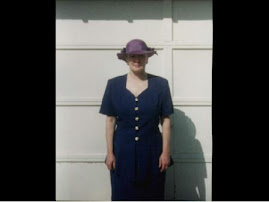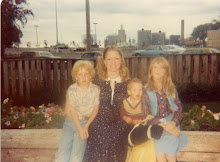Me in my band uniform with my saxophone in autumn
of 1966. This is the front yard of the farm I grew up on.
What were the political issues of the late 1960's? Were they so different from what they are now? Why hasn't more change been implemented? Here's some of the main things that were on our minds back then. Also, check out the website "An Oral History of 1968."
1. Viet Nam War. Many of us protested this devastating and illegal war in Southeast Asia. Some protestors were killed. Many were arrested. The refusual of the Nixon administration to listen caused organizations to spring up such as the SLA whose members were willing to fight back in any way possible. There was the Chicago Seven, Abby Hoffman with his book "Steal this Book," and a myriad of protest songs by such songwriters and musicians as Bob Dylan, Country Joe MacDonald, Peter Paul & Mary, Arlo Guthrie and others. We did instigate some changes; unfortunately, sometimes it seems like we're right back where we started. I heard Arlo Guthrie and Pete Seeger at the Minnesota Zoo back when Ronald Reagan was President. Arlo said, "Too bad these old protest songs are still relevent."
2. Racial and Gender Inequality. We have fought the good fight for racial equality for many decades. We have seen a small amount of progress but not nearly enough. Every state should pass it's own Equal Rights Amendment. Back in the 1960's, Women's Liberation was a big deal. We've come a long ways, but not far enough. There are still too many disparities in many areas.
3. Rights of Students. The year I graduated from high school (1968) was the last year that girls had to wear dresses or skirts to school. The Civil Liberties Union got involved in that one. The following year girls could begin wearing slacks.
4. Draft Dodgers. On January 5, 1968, Dr. Benjamin Spock; William Sloan Coffin the chaplain of Yale University; novelist Mitchell Goodman; Michael Ferber, a graduate student at Harvard; and Marcus Raskin a peace activist are indicted on charges of conspiracy to encourage violations of the draft laws by a grand jury in Boston. The charges are the result of actions taken at a protest rally the previous October at the Lincoln Memorial. The four will be convicted and Raskin acquitted on June 14th.
5. Does the 1968 Presidential Election have any lessons for Minnesota's 2010 Gubernatorial Election? Take a look at this website.
6. Media Exposure and Political Attitudes. Here's the .pdf website.
7. Generational Disputes. In the late 1960's and early 1970's, parents were distraught about their children who were "turning on, tuning in and dropping out." This was a phrase coined by Timothy Leary in the 1960's. Read about it here. Is today's drug culture the same as it was back then? No.
8. First Amendment Rights, particulary in the media. Read about it here.
Comments welcome on political issues then and now.






April Knight,
ReplyDeleteInteresting post, with which I mostly concur, but must question #7 regarding generational disputes. True, our generation in the '60s got politically drygulched by established economic interests, which required a concerted response. We thought Love would set things right and tried very hard. Unfortunately, a lot of folks needed to be pretty doped up to get that friendly. And lots of folks joined manipulationist religious sects to get straightened out. Result was twice the emotional retardation dope and religion could furnish separately. Government by discussion --the reason for the countercultural movement-- was never restored. I don't see this as much different from current dope culture at all. What has changed is band uniforms. In the '60s we looked like refugees from Valley Forge. Kids look a lot snappier now.
Geo.